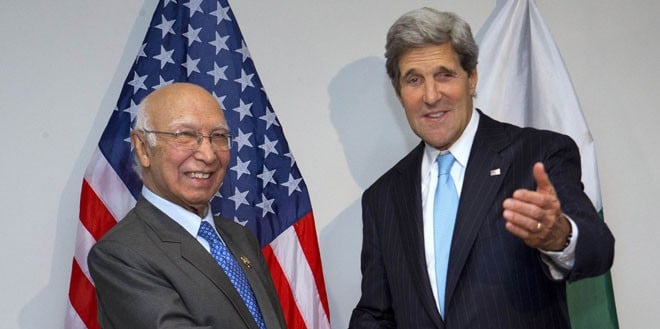

The US Secretary of State, John Kerry, will host a ministerial-level meeting in Washington, DC, on January 27, 2014 as part of the re-energised US-Pakistan strategic dialogue process. Both the countries will identify opportunities for increased partnership in areas of bilateral cooperation, including law enforcement and counter-terrorism, economic growth and finance, energy, defense, and strategic stability.
In Pakistan, such ministerial dialogue is viewed as a cosmetic exercise. General public finds a sharp contrast between such meetings and the divergent actions of the two "allies". Had these dialogues been so strategic, things would have been changed by now in the region. Afghanistan would have been tranquil. Pakistan would not have faced a grim wave of terror. The war on terror would have been over. On the contrary, the strategic dialogue is proving ‘strident nothing’.
The Pak-US relations are very important for reducing terrorism in Pakistan. Pakistan is in the state of war at the moment. Hence, it direly needs financial and strategic support from the US. However, both are missing golden opportunities for mutual cooperation. If the Raymond Davis, Salala incident, May 2 operation Geronimo are a few irritants from the US side. The Pakistani security agencies’ alleged support to the Afghan Taliban, Haqqani Group, and Lashkar-e-Tayyaba (LeT) are equally ruining the bilateralism. Both the countries are in the state of a Cold Peace or may we call it "estranged allies".
They are trying to achieve their common goal of defeating terrorism through their divergent approaches. And hence they are dealing with each other by pretending not to deal with each other. This is the point where both are deceiving themselves rather than the other.
The Obama administration has to take care of the majority of the Congressmen. On the other hand, the Nawaz administration has to take care of certain political parties like the Jamaat-e-Islami and the Tahreek-e-Insaaf. Thus, their respective domestic political compulsions are drifting them away from inter-governmental cooperation. In these circumstances, what will they lose?
Closing Nato supply lines and anti-US rallies as well as non-cooperation with the US in strengthening post-2014 Afghanistan could lead to reduction of the direly needed US aid to Pakistan. The US anti-Pakistan stance, pro-India policies in Afghanistan and not understanding Pakistan’s problems may reduce Pakistan’s cooperation in the post-2014 scenario which may bring a defeat to the US in its long war against terrorism. Thus, the US and Pakistan have no option but to cooperate with each other, or they should get ready for the irreparable loss. It would be like the endgame with a total loss for the both.
What is to be done? For Pakistan, one understands its fear of India. However, Indians are more interested in economic development. It’s not a secret. It’s a broader world view that we, somehow, usually do not understand. The term ‘strategic’ must be redefined in changing circumstances. Strategic now means economic development, regionalism, cooperation with neighbours, increase in trade and human security. Thus, we need to see what we can invest in the post-drawdown period. We need to assess how much dependent Afghanistan can be upon us as far as its needs of daily provision are concerned. Pakistani Panadol, Paracetamol, edible oil, eggs, chicken, mutton, wheat and rice are more important and welcome than anything else in Afghanistan. And over and above, Pakistan needs to stop the double game.
For the US, interference in Pakistan’s internal affairs is not acceptable to any Pakistani. Such feelings are flaring up the anti-US propaganda. Linking Shakeel Afridi’s release with the US aid to Pakistan can be equated with interference in Pakistan’s judicial affairs. If Shakeel Afridi is innocent, he will prove it in the court of law.
Today, Pakistan’s courts are much more free and vocal with judicial activism than ever before. Afia Siddiqui has also been imprisoned in the US and the verdict has been given by the US courts. Pakistan could have linked the release of Afia Siddiqui with its cooperation with the US in its war on terror. However, Pakistan behaved maturely and always kept the two issues separately. There are political realities in Pakistan and in the US too. Thus a mutual respect and understanding of realities is the cornerstone of a durable relationship between the two countries.
Pakistan and the US are following a policy of obstructionism. Islamabad and Washington are frustrated with each other. Pakistan, a country that was supposed to play a very active role in the reconstruction and development of Afghanistan specially in the post-2014 era, has been marginalised. Washington is more interested in New Delhi for shaping Afghanistan’s political, economic and military future. It’s a fact that India has contributed, in a very docile manner, to Afghan development through reconstruction and private investment projects. The US, which is taking care of Afghanistan, is aware of India’s contribution. Hence, Indo-US alliance is looking for a "New Silk Road" by improving Afghanistan’s economy and expanding regional trade.
India has contributed immensely in capacity-building of the armed forces of Afghanistan by training and simulation exercises. This further strengthens its role in the inner corridors of Afghanistan. Though Indian role is very positive in its contribution to the development of Afghanistan, no one knows its clandestine activities which would come to the limelight once Pak-India animosity comes to the fore. Thus, Pak-US relations can’t be repaired without investigating into the Indo-US alliance in Afghanistan.
Now the point is if Pakistan is missing a golden opportunity of making Afghanistan a good friend. Losing the US as a financial supporter and a friend at international forum, facing a cold war with India in Afghanistan, or letting antagonistic and annoyed friends to join hands are no options for Islamabad. This is the time Pakistan must chalk out a comprehensive foreign policy in which not a country, not a region but a combination of inner and outer factors should be analysed for a smooth sailing of its interests.